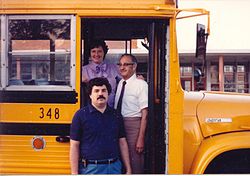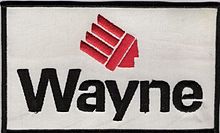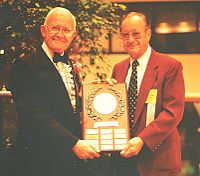- Virginia Overland Transportation
-
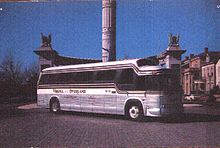 A Virginia Overland GM Buffalo bus motorcoach VO-72 on Monument Avenue in Richmond, Virginia in 1982.
A Virginia Overland GM Buffalo bus motorcoach VO-72 on Monument Avenue in Richmond, Virginia in 1982.
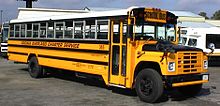 Bus 365 was a 1988 Navistar International school bus with a Wayne Lifeguard 71 passenger body in Richmond, Virginia
Bus 365 was a 1988 Navistar International school bus with a Wayne Lifeguard 71 passenger body in Richmond, Virginia
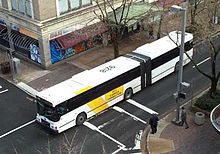 A Volvo suburban articulated bus in contract service for Virginia Commonwealth University in Richmond, Virginia, operated by Virginia Overland Transportation in 2003. This bus, built new in Chesapeake, Virginia, was previously in service with New Jersey Transit.
A Volvo suburban articulated bus in contract service for Virginia Commonwealth University in Richmond, Virginia, operated by Virginia Overland Transportation in 2003. This bus, built new in Chesapeake, Virginia, was previously in service with New Jersey Transit.
Virginia Overland Transportation (VOTC) was an organization in Virginia in the United States which operated new and used bus dealerships and a number of intrastate urban-suburban bus lines for about 30 years in the late 20th and early 21st centuries.
Beginning as a school bus management consulting service in 1973, beginning in 1976 and throughout the 1980s, Virginia Overland acquired and consolidated a number of other privately-owned Virginia public service companies, some dating back to streetcar and interurban operations in the early 20th century. Based primarily in the Richmond-Petersburg region, at one time or another, the company also operated local bus services in Northern Virginia and the Hampton Roads areas of the state. By 1984, it was operating the second largest privately-managed fleet of school buses in Virginia, a school bus contractor second in size only to Laidlaw Transit. The company also represented Wayne Corporation and several other franchised product lines of buses and related products. It sold approximately 3000 new and used buses between 1976 and 2004.
Itself a consolidator of mostly smaller companies and operations, VOTC combined forces with a larger woman-owned business based in Hampton, Virginia in the early 1990s, and the larger company assumed some of the former VOTC subsidiaries and new operations developed jointly after several years. Meanwhile, although Wayne Corporation closed and was liquidated in 1992, VOTC saw its other former franchise manufacturers also acquired by bigger companies. As a result of the dwindling number of bus dealership opportunities among a smaller number of manufacturers, their consolidations forced VOTC and many other bus dealers into what one VOTC principal described wryly as "a corporate version of musical chairs."
As the principals aged, and its dealership opportunities and volume waned, VOTC downsized and ultimately closed its then-sole Richmond location in 2004. However, as of 2010, some of the former VOTC employees and operations in eastern Virginia continued under the ownership of Serco Group, an operator of over 600 contract locations internationally.
History, growth through acquisitions
Virginia Overland's parent company was formed in 1973 as a small school bus management and consulting company. In 1975, it expanded into operating a cooperative school bus system serving 5 independent schools in the Richmond area. The following year, the service had grown to 13 schools and the company began to acquire all or controlling portions of a number of other older Virginia public service transportation companies, some with roots back to interurban streetcar operations as early as 1915, and urban-suburban bus line bus operations dating from 1928. (Under Virginia law, an "urban-suburban bus line" is defined as a bus service "the majority of whose passengers use the buses for traveling a distance no more than forty miles, measured one way, on the same day, between their residences and their places of employment, stores, or schools.")
Transportation services
As an innovative and versatile provider of privatization services, Virginia Overland Transportation contracted school bus transportation, commuter transportation, paratransit services, university inter-campus transportation, shuttle bus services, special event operations, and chartered bus services for federal, state, and local government agencies as well as non-profit organizations, businesses and companies.
Virginia Overland's largest long-term contracts included the yellow school bus systems for Petersburg City Public Schools from 1981-1989, Hopewell City Public Schools from 1984-1996, and Virginia Commonwealth University's campus transit services from 1989-2004. The company also transported the Richmond Jewish Community Center's summer day camp program for 27 years, and operated the shuttle bus system at Richmond International Raceway from 1989 to 2004. The company operated an FTA award-winning welfare-to-work van service in the Richmond under contract to Greater Richmond Transit Company from 2001-2004.
Emergency services
Virginia Overland staff utilized the company's resources to assist in emergency situations in its communities on several instances.
On the morning of February 24, 1977, the Benjamin Harrison Memorial Bridge on the James River near Hopewell was struck by an ocean-going tanker ship, severing State Route 156, a major commuter artery between Charles City County and Prince George County. Later on the day of the accident, state officials called upon local bus, taxicab, and water transportation providers, including both Greyhound Lines and Trailways, to offer potential solutions for the commuters. Virginia Governor Mills E. Godwin Jr.'s Office of Emergency Services selected Virginia Overland to operate the land portion of what became an innovative solution, a hybrid combination of land and water services to comprise a unique system for commuters, which was in operation within 3 days, essentially operating from dawn to dusk. Virginia Overland used two-way radio-equipped vans and school buses based on each side of the river to coordinate with the passenger ferries. Expanded parking was provided by VDOT at both docks. During this operation, commuters would drive to the ferry dock area on the side of their residence and literally "Park, Ride, and Ride." The van and bus service on the south shore ran between the dock at Jordan's Point and various schools and places of employment, including many businesses in Prince George County, Hopewell and notably Fort Lee, a large base of the U.S. Army located nearby.
In the opposite situation, some workers who lived on the south side of the river, parked and rode the ferry, and then vans or buses transported them to employment, mostly at Charles City County Public Schools and other governmental offices. Services continued for 20 months until the bridge was reopened.
In 1984, during a large cold weather industrial fire, the company was commended by the Richmond Bureau of Fire for taking the initiative of sending a transit bus to the scene and operating it all night to provide shelter for fire fighters. The company also won praise from the Hopewell Fire Department for its response during the August 6, 1993 Virginia tornado outbreak in the Tri-Cities area which killed 4 people and caused $50 million in property damage. The company sent staff and school buses from its Richmond terminal to provide shelter from the rain and shuttle services for displaced elderly residents from a large heavily-damaged apartment complex.
Bus dealerships
Virginia Overland operated several bus dealerships serving primarily Virginia and North Carolina, most notably a franchise for Wayne Corporation which delivered over 2,000 new school and commercial buses between 1976 and 1990. More than a few of Wayne's dealerships were operated by school bus contractors. ARA Transportation and Laidlaw were the largest. Others included Bus and Bodies of Plaistow, New Hampshire, Town & Country Transportation of Warren, Rhode Island, Rohrer of Duncannon, Pennsylvania, and School Bus Services of Shawnee Mission, Kansas. These school bus contractors, several of whom were also involved in contracting paratransit services, found having a dealership provided both a source and an input to product design at Wayne, as well as a natural outlet for sale of surplus equipment at the end of contract periods.
Wayne Corporation and Virginia Overland each enjoyed some especial profitable years in the late 1970s, buoyed by sales of Wayne's revolutionary Busette, a small school bus based upon the then-new cutaway van chassis which since have become a staple of the small school bus, recreational vehicle, and smaller delivery truck markets in the U.S. A higher-headroom version of the Busette, named Transette, also did very well in both the Virginia and national markets during this time.
In the 1980s, U.S. school bus body manufacturers faced a serious decline in sales of conventional school buses as both the bubble in school populations resulting from the baby boom generation and the era of court-ordered desegregation school busing each passed.
As did many other school bus body dealers in the U.S., in the early 1980s, Virginia Overland diversified its products lines from handling only Wayne products to representing additional franchised product lines, including small school buses by Mid Bus, based in Lima, Ohio, and smaller and mid-sized commercial buses produced by Champion Bus Incorporated of Imlay City, Michigan, as well as adding dealerships for several manufacturers of wheelchair lifts and accessories. However, by the late 1980s, despite major concessions by its labor union, the future business outlook at Wayne Corporation, Virginia Overland's primary franchiser, had become bleak. The company operating the factory was forced to declare bankruptcy and was liquidated in 1992.
Including the new buses from Wayne, Virginia Overland sold approximately 3,000 new and used buses and vans to its customers between 1976 and 2004 from its dealership locations in Henrico County, Petersburg, Hopewell and Richmond.
See also: Wayne CorporationEmployees, labor problems
Virginia Overland Transportation was staffed by many employees with prior public service expertise, including current and former GRTC and Richmond Public Schools employees, as well as some from other local public school divisions and retirees from military service and other organizations. The wide range of services and bus equipment combined to attract bus enthusiasts as employees. At its peak in 1984, the company was operating 135 revenue vehicles, and had over 175 employees.
In October 1986, some of the employees at the largest operation in the Tri-Cities area and the Amalgamated Transit Union (ATU) petitioned the National Labor Relations Board (NLRB) for labor union elections. The company management felt that a unionized operation could not compete with the advantages of school district self-operation of school buses because public employee unions of school bus employees are generally not recognized by local and state government in Virginia, a right-to-work state. (In 1976, a similar unionization attempt of school bus drivers working for ARA Transportation, another school bus contractor, by the Teamsters Union in Norfolk, had resulted in considerable violence and several almost new Wayne Lifeguard buses were burned by protesters. The unionization attempt there essentially failed after the Virginia State Police assisted in ensuring that the Norfolk City Public Schools bus operations were not interrupted by the protesters).
In an attempt to avoid an election, Virginia Overland management appealed the request for election. NLRB hearings were held on several issues in the fall of 1986 and early 1987 in Richmond and Petersburg. However, the company was unsuccessful in blocking an election. Following an NLRB determination that an election be held, approximately 75 of Virginia Overland's hourly transportation and maintenance employees voted at the Petersburg terminal in May 1987. The election results were to remain non-union.
Reverse privatization
Virginia Overland's labor problems and NLRB hearings were closely watched by the public school officials from Petersburg and Hopewell. Two years after winning the election and remaining non-unionized, at the expiration of the current contract period in 1989, the largest portion of its services were assumed by self-operation by Petersburg Public Schools in 1989. Another smaller contract operation for nearby Hopewell Public Schools also converted to self-operation in 1996. The only other public school bus contract in Virginia at Norfolk (operated by Laidlaw Transit) had also converted to self-operation in 1991.
The 3 school division conversions, at Petersburg, Norfolk and Hopewell, were urged by Virginia Department of Education officials as "cost-saving". The contracting companies unsuccessfully disputed the state's financial calculations and cost allocations for the reverse privatizations, which effectively ended all public school bus contracting in Virginia at the time.
Teaming with JL Associates
In late 1990, the Virginia Overland staff joined forces with JL Associates, Inc. (JLA), a woman-owned Hampton, Virginia provider of federal, state and municipal contractor services which had been founded in 1978. With the larger JLA as the lead company, the principals of JLA and VOTC worked together for several years. They successfully developed and added a number of services and contract locations ranging across the United States, notably in areas of parking enforcement operations and school transportation. In 1998, JLA was acquired by U.K. based, Serco Group as it expanded its North American operations. [1]
Two expansions in the Hampton Roads region which were undertaken during the 1990-1993 time period when staff from VOTC and JL Associates, Inc. of Hampton were continuing to operate as of April 2010. Initially based upon a former operation of Laidlaw Transit (Virginia), Transquest provides bus contract operations transporting students to independent schools in multiple South Hampton Roads localities from its base in Norfolk. Another local services section also operated by the Serco Group is the maintenance portion of the school bus operations of Portsmouth City Public Schools.
Richmond operations 1993-2004
Following completion of the projects working with JLA, VOTC consolidated its two locations in Richmond for dealership and transportation services into a single site in 1993. Following closure and liquidation of Wayne Corporation in 1992, and sale of Champion's bus manufacturing operations to a competing company several years later, VOTC never regained its former volume of new school bus sales. Its franchise dealership with Mid Bus ended in 1997. In 1998, Mid Bus operations were acquired by a larger competitor. [2] Mid Bus operations in Bluffton, Ohio were closed completely by its new owners a few years later. [3]
Overland Bus Sales operating as VOTC continued to operate passenger services based in Richmond until 2004. A contractual relationship with Virginia Commonwealth University (VCU) for a wide range of passenger transportation services, first begun in 1989, continued after winning several competitive contracts and renewals, notably in 1993, 1995, and 2001. Also later in 2001, the company won a new competitive contract to operate CARE, an award-winning welfare-to-work van program serving the region provided by Greater Richmond Transit Company (GRTC), the local public transit agency in Richmond, Virginia jointly-owned by the City of Richmond and Chesterfield County. Each contract ended in June 2004, when GRTC assumed self-operation of both the CARE program and assumed provision of the VCU Campus Transit system using Federal Transit Administration (FTA) funded equipment. Virginia Overland Transportation's parent corporation and its Richmond operating subsidiary were dissolved in 2005, although several of the former subsidiary had been consolidated in JLA and, therefore, later became part of Serco Group's North American operations. As of 2010, Serco listed over 600 contract operations world-wide, including some of the former JLA and VOTC operations and employees. [1]
Founders: retirements and deaths
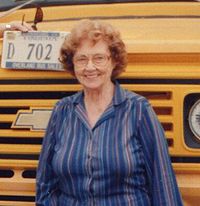 Ruth Fisher, retired co-founder of Virginia Overland Transportation, posing with her specially-assigned dealer license plate, at a bus auction in Chesterfield County, Virginia in 1998
Ruth Fisher, retired co-founder of Virginia Overland Transportation, posing with her specially-assigned dealer license plate, at a bus auction in Chesterfield County, Virginia in 1998
Marvin and Ruth Fisher each retired from their major roles and directorships of VOTC in 1996. Another key person, Sigvart Sande, was essatntially the number 2 person at JLA answering to Linda G. Watkins, principal-owner. As JLA and VOTC joined forces on a number of projects, Mr. Sande became involved with the bus companies during the period they worked together to expand and add new business in the early 1990s, and had a major influence in uniting the cultures of the two organizations, as he was known for his willingness to listen to others, and was highy respected by all.
In the early 1990s, both Sig Sande and Marvin Fisher battled personal cancers while still working. Even as their personal health declined, they each contributed to the future well-being of the various business activities. They died within weeks of each of other in March 1997.
Sigvart Sande
A native of Norway, "Sig" Sande was graduate of Stanford University, and a retired Lt. Colonel with the United States Navy. A long-time JLA principal, he become involved with the bus operations in 1991. Mr. Sande served as an officer of the former Virginia Overland portion of JLA, working closely with VOTC principals and managers. He had long been the chief operating officer of the entire JLA Organization when he died at the age of 63 on March 12, 1997. [4]
Mark, Marvin and Ruth Fisher
Former VOTC Chairman, Marvin H. Fisher, succumbed to cancer and died March 24, 1997 at the age of 79. Several years later, his widow, Ruth E. Fisher, developed early stages of dementia. As her needs became greater, their son, Mark D. Fisher, retired in 2004 after a career of over 30 years in Virginia, and became his mother's full-time caregiver. They moved to their retirement home near the quiet and historic community of Williamsburg, Virginia (located about 55 miles east of the former VOTC home base city of Richmond, and 30 miles west of Hampton). After a brief hospitalization, Ruth Fisher died peacefully at the age of 89 on September 15, 2007.[5] Mark D. Fisher passed away on April 30, 2011 in Williamsburg at the age of 59.[6]
Listing of Virginia Overland's predecessor organizations, dates formed
- Petersburg and Appomattox Railway (founded 1915)
- Hopewell and City Point Railway (founded 1915)
- Petersburg, Hopewell, and City Point Railway (founded 1916)
- Richmond Ashland Railway (founded 1918) successor to Richmond and Chesapeake Bay RR
- Petersburg, Hopewell, and City Point Transportation Co. (founded 1928)
- Petersburg-Hopewell Bus Lines (name change 1939)
- Bon Air Transit Company (founded 1946)
- Tri-City Coaches, Inc. (founded 1958)
- Hopewell Bus Company (founded 1965)
- VRH Corporation (founded 1973)
- Virginia Overland Transportation Co. (name change 1975)
- Virginia Overland Charter Service (trade name 1976)
- Virginia Overland Bus Sales (trade name 1976)
- Virginia Overland Tri-City Coaches, Inc. (acquisition 1-1-1981)
- Dominion Coach Company (founded 1983)
- Virginia Overland Bus Lines (trade name 1983)
- Laidlaw Transit VA (Norfolk) (partial acquisition 1985) (Note: an eastern VA subsidiary of Laidlaw Transit only)
- Mechanicsville Bus Line (founded 1988) successor to Capital City Coaches affiliate of Roane Bus Lines
- Virginia Overland Transportation Services, Inc. (aka VOTS) (1990) (name change)
- Overland Bus Sales (trade name 1990)
- Virginia Public Service Transportation (trade name 1992)
See also
- Urban-suburban bus line
- Transportation in Richmond, Virginia
References
- ^ a b http://www.serco.com/media/pressreleases/1998/003_1998.asp
- ^ http://www.fundinguniverse.com/company-histories/Collins-Industries-Inc-Company-History.html
- ^ http://www.medindia.net/health-press-release/Company-Announces-Closure-of-Bluffton-Ohio-Plant-4286-1.htm
- ^ http://www.stanfordalumni.org/news/magazine/1997/novdec/classnotes/obituaries.html
- ^ http://www.stnonline.com/cgi-bin/artman/exec/view.cgi?archive=66&num=7151
- ^ "Former owner, president of Virginia bus company passes away". School Bus Fleet. 4 May 2011. http://www.schoolbusfleet.com/Channel/Contractors/News/Print/Story/2011/05/04/Former-owner-president-of-Virginia-bus-company-passes-away.aspx. Retrieved 6 May 2011.
Categories:- Bus companies of the United States
- Defunct companies based in Virginia
- Transportation in Hopewell, Virginia
- Transportation in Petersburg, Virginia
- Transportation in Norfolk, Virginia
- Transportation in Portsmouth, Virginia
- Transportation in Hampton, Virginia
- Vehicle retailers
- History of Richmond, Virginia
Wikimedia Foundation. 2010.

